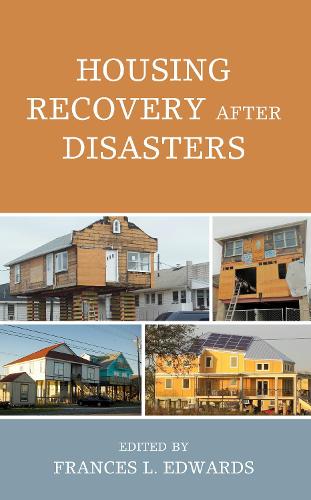
Housing Recovery after Disasters
(Hardback)
Publishing Details
Housing Recovery after Disasters
By (Author) Frances L. Edwards
Contributions by Miriam Belblidia
Foreword by Louise K. Comfort
Contributions by N. Emel Ganapati
Contributions by Jerry V. Graves
Contributions by Alessandra Jerroleman
Contributions by John J. Kiefer
Contributions by Anuradha Mukherji
Contributions by Christa L. Remington
Contributions by Jason D. Rivera
Bloomsbury Publishing PLC
Lexington Books
15th August 2019
United States
Classifications
Professional and Scholarly
Non Fiction
363.3483
Physical Properties
Hardback
222
Width 161mm, Height 228mm, Spine 23mm
522g
Description
Recent disasters have demonstrated the critical role that re-housing victims play in communities long term disaster recovery. This book examines the history and theories of rehousing, the role of bonding social capital, applies systems theory to understanding the stages of recovery, then presents case studies of long term housing recovery following Hurricane Katrina and Hurricane Sandy in the United States, Hurricane Maria in Dominica, the 2010 earthquake in Haiti, and a variety of disasters in Turkey, Nepal, Japan, and India. Together these chapters address what Dr. Louise Comfort has called one of the most persistent and difficult policy problems in the field: long term recovery of communities following disaster.
Reviews
Long Term Recovery, Public Policy, and Housing, edited by Frances Edwards, experienced emergency manager and scholar, and contributions by emerging and senior scholars in the field, addresses one of the core elements of community resilience based on major disasters such as hurricanes and earthquakes. The book provides major challenges and sound housing recovery policies and implementation strategies based on field research of extreme disasters. Housing is addressed as a key measure and priority for long-term community recovery, as a complex policy problem, and needed carefully designed public programs to enable communities to rebuild after disasters for resilience and sustainability. -- Naim Kapucu, University of Central Florida
Long-Term Recovery and Housing: Public Policy and Household Impacts by Frances L. Edwards is a much needed addition to the literature on disaster recovery and will be a valuable resource in academic and professional libraries. Having taught courses in long-term recovery and development following catastrophic disasters, Ive found the literature to be very thin regarding the issue of housing and business recovery. In particular, adequate attention is not given to the importance of housing as a social, economic, political, and cultural aspect of community recovery. The chapters in this volume address the legal, financial, and practical concerns that shape the community as it recovers from the loss of housing stock and businesses. The lessons are drawn in a variety of domestic and international contexts. -- William L. Waugh Jr., Georgia State University
This informative, engaging, concise, and diverse volume explores the successes and failures of post-disaster housing recovery. The authors have conducted field work at their disaster sites, thus adding authenticity, rich description, and first-hand observation. Housing is basic. Few things mobilize community interest more than deciding how to go about rebuilding, replacing, and resuscitating local disaster impacted housing. A paramount indicator of disaster recovery is satisfactory reconstitution of housing in disaster impact zones. Contributors use a variety of social scientific approaches to analyze, critique, and measure resilience, bonding social capital, small business recovery, cultural competence of aid workers, and more. -- Richard Sylves, emeritus, University of Delaware
One of the biggest casualties following every disaster is the damage to housing in the region. And with such disasters likely to increase, well have to reckon with these consequences ever more frequently. In this lively book, the authors crack open the problem with fresh insights and rich data, in ways certain to bring more of the imaginative ideas we surely need. -- Donald F. Kettl, LBJ School, University of Texas at Austin
Author Bio
Frances L. Edwards is Deputy Director of the National Transportation Security Center at the Mineta Transportation Institute and professor and director of the Master of Public Administration program at San Jose State University.
